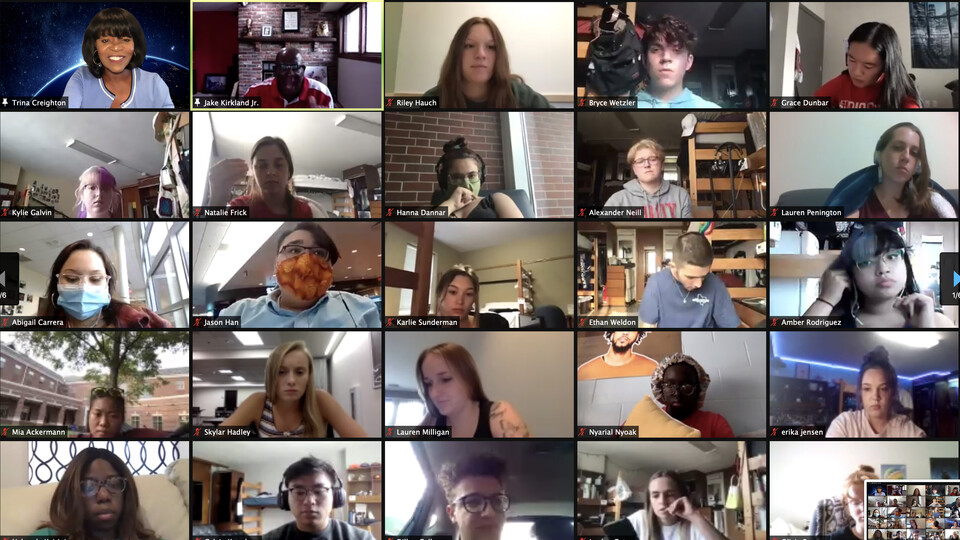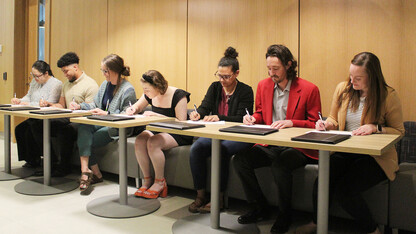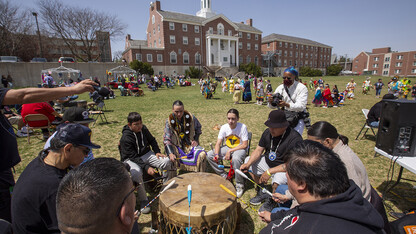· 4 min read
Creighton starts book club to spur social justice conversations

Trina Creighton is a broadcast journalist and anchor turned college professor.
More importantly, she’s focused on teaching 200 to 250 students a semester about social justice through her courses, “Social Justice, Human Rights and the Media,” and “Race, Gender and the Media.”
With renewed passion, she’s taking what she’s learned by teaching students and using it to start discussions with her colleagues, too.
At the start of every class she teaches, Creighton plays a song as students are walking in (or logging onto Zoom), but the first day of class, it’s always one particular song — “Waiting on the World to Change” by John Mayer.
At the end of the song, she asks her new class of students, “How many of you are waiting on the world to change?”
The question typically sets off the very first class discussion, and this year was no different — despite the online format. Creighton was blown away by the 181 students’ enthusiasm and willingness to converse.
Following the end of the first Zoom class, she received around 30 emails from her students. Some just said they were eager to learn more about current social justice issues while others relayed that she was the first Black professor they’ve ever had.
“When you come to my class, I don’t tell you what to think about the information I present to you, I don’t tell you how to feel about it,” said Creighton, associate professor of broadcasting. “That’s where the discussions come in, and then my students make up their own mind about how they absorb the information.”
Most of the time, Creighton’s students add to the information she presents, and she learns something, too. She knows her students need an outlet and want to talk about racial inequality; they want to know how movements like Black Lives Matter work and how to keep them going.
“I’m just the captain, and I give my captain’s hat to my students throughout the course so that we all learn from each other, and that’s why I call it an educational experience,” Creighton said.
To Creighton, her social justice course is about helping her students see where they can fit in to make a better society and she feels fulfilled in her teaching role when she hears them talking about being better citizens.
The murder of George Floyd spurred her to start new conversations. Growing up she was always taught that it wasn’t her place to talk about race with white people, but after watching something so tragic and horrendous ,she knew she could no longer “stay in her place,” she said.
She reached out to College of Journalism and Mass Communications leadership, Dean Shari Veil and Amy Struthers, professor of advertising and former interim dean, about facilitating a conversation about race with her colleagues. It was a conversation that hadn’t taken place in her 19 years of being at the college and it was time.
Struthers and Veil wholeheartedly agreed and the first book club gathering for journalism faculty and staff took place a few weeks later. The group’s first discussion was over the book, “White Fragility: Why It’s So Hard for White People to Talk About Racism,” by Robin DiAngelo.
It was such a success that Creighton has already chosen the next book for the group, “How to Be an Antiracist,” by Ibram X. Kendi.
“The murder of George Floyd is not only is changing the world, it changed me,” Creighton said. “I don’t know if I would be speaking up like I am now, or taking a leadership role without this movement.”
More than ever, Creighton is asking her students and colleagues to follow the advice of the late John Lewis:
“When you see something that is not right, not just, not fair, you have a moral obligation to say something. To do something. If you see something, say something.”
Creighton believes people are starting to see that they have more to give than they realize and that brings her hope.







